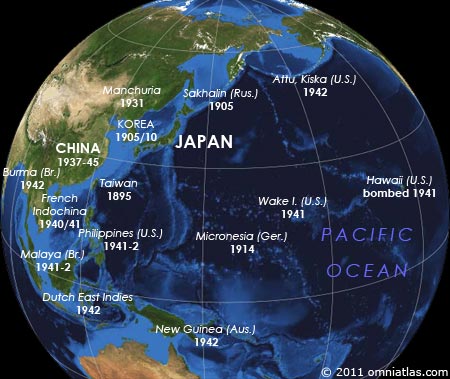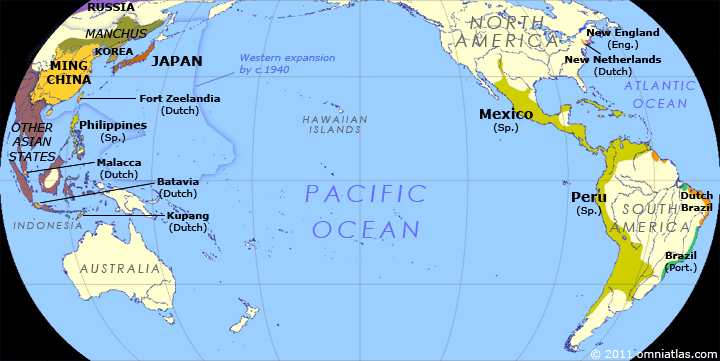
Figure 1. The expansion of Japan, 1895-1942. Why so late?
In 1492, Columbus sailed west into the Atlantic in the expectation of reaching "Cipangu" (Japan). In 1942 [2], Cipangu struck back. Sweeping away the European overlords of Southeast Asia in a few short months, its modern military and navy undid centuries of colonial rule. However, it was three hundred years too late.
While Japan had been waiting in self-isolation, America had been colonized and built itself into a superpower. When Japan finally joined the modern world in the late 19th century, ironically enough because of American pressure, it was to be the sole Asian great power on a planet ruled by the West. Its great expansion in 1942 was really a desperate bid to rectify the situation, one that would lead to Japan's total defeat at the hands of America in the Second World War.
But did things really have to happen this way? Why indeed did Japan and China close themselves off from the world in the early modern era, letting Europe seize not just the Americas but strategic Asian territories?
Japan's First Modernization
The 19th century was not the first time Japan had opened its doors to the West and modernized its armed forces. It had also done so in response to the arrival of European traders in the 16th and early 17th centuries.
The Portuguese first introduced firearms, in the form of the arquebus, into Japan in 1543. The Japan of the time was divided amongst squabbling warlords, some of whom were eager to adopt Western military technology to gain an edge over their opponents.
By the 1570s, Japanese factions were not only fielding armies of thousands of trained arquebusiers but had also mastered the production of their own firearms. In 1590, Toyotomi Hideyoshi, one of the gun-backed warlords, finally unified the country.
The Japanese navy also expanded and modernized in this period. From the late 16th century, armed Japanese merchantmen spread throughout Southeast Asia. These "red-seal ships" would also send Japanese adventureres and mercenaries as far afield as Indonesia, Thailand, and India.
Other Japanese traveled even further. With the aid of the English sailor William Adams, Japan built several modern warships, sending expeditions to Mexico in 1609, 1613, and 1617. [3]
A Seventeenth Century Co-Prosperity Sphere?
Using their modern army, the Japanses overran Korea in 1592, remaining there until Chinese and Korean resistance finally evicted them six years later. But this was where their expansion ended. [4] In the 1630s they proceeded to ban Christianity and the building of ocean-going ships and restricted foreign trade to a Dutch outpost off Nagasaki, policies which remained in place until Japan was "re-opened" in 1853.

Figure 2. Japan and the Pacific in the 1640s. Better odds than in the 1940s?
So why did Japan stop here? They had the biggest modern army in the Far East and could have built a sizeable navy to go with it. With such forces they could easily have allied with the Dutch to oust the Spanish from the Philippines, then turned on the Dutch to drive them out of Indonesia. Having won the Pacific War in the 17th century, they could then have moved to colonize the west coast of North America and maybe even expel the Spanish from Mexico and Peru.
Militarily this was possible - East Asians were quite capable of conquering Western European held islands. Dutch-led Japanese mercenaries helped overthrow the Portuguese in Southeast Asia in the early 17th century and a Chinese faction was perfectly able to seize Dutch ruled Taiwan in 1662.
The Japanese also had strong incentives to strike. Economically, you don't need post-1942 hindsight to see the benefits of controlling the world's spice and silver supplies, not to mention dominating the sea trade with China. Militarily, the Europeans were divided among themselves with their vulnerable Asian colonies at the end of over-stretched supply lines. Politically and culturally, Japan also wanted to do away with the influence of European missionaries.
The Regime's Perspective
Everything about Japan's situation in the 17th century suggests it had the advantages that Morris gives Europe in the 15th century (see the previous article). Physical geography, proximity, economic and developmental incentives all favored Japan. Yet they were not enough.
Things become a little clearer when we stop talking about Japan and start talking about the Japanese regime, the ruling body in any given period. During the civil war and again during the late 19th and into the 20th centuries, Japanese regimes faced existential threats - internal and external competitors that could potentially overthrow them. It was during and immediately after these periods that Japan's modernization bids took off.
By contrast, in the period inbetween (1615-1853), Japan remained largely unthreatened and modernization was no longer necessary for state survival. Indeed the only serious threats to the regime were internal revolts. Not only could these threats be suppressed without modern technology or foreign involvement, those factors actually increased the risks involved.
Peasants or rival factions armed with guns were harder to defeat than those using traditional weapons, while foreign influences were more likely to inflame internal divisions than promote stability. Similar arguments could be made against overseas colonization, which would both enrich and empower the individuals involved and thereby also pose a threat to the regime. [5]
The Power of Existential Threats
Note that I talk here about existential threats rather than just competition. Competition is often brought up as a reason for the rise of Europe, comparing for instance Columbus' ability to go from kingdom to kingdom to gain a sponsor with the Chinese Empire's ability to forbid all overseas voyages.
However there is usually no attempt to quantify what is sufficient competition or whether competition exists on some sort of sliding scale. In 17th century East Asia, there was sufficient imperial rivalry that Japanese and European adventurers could travel between states seeking employment yet not enough to keep Japan on the path of modernization.
Thus the competition provided by the existence of multiple powers was insufficient in itself to create a Europe-style takeoff. What was needed was something more potent - existential threats.
It has often been pointed out that Europe's peninsulas, islands, and mountain ranges made unification difficult. Perhaps equally important is that they never made it impossible. No European power could ever afford to drop its guard or risk being left behind in the races for technology or overseas influence. Every possible advantage needed to be fought for, as even the most secure European regimes could fall to foreign invasion if they weren't careful. [6]
Japan's ruling body, on the other hand, was never so threatened, at least not between the attempted Mongol invasions in the 13th century and the arrival of the Americans in the 19th. It was indeed secure and hence had no need to risk the instability that usually accompanies modernization and colonization.
So despite a promising start, the Japanese Empire failed to modernize or found a colonial empire in the 17th century because it didn't need to do those things to survive. And if this explains Japan's self-isolation, what clues does it give us to explain China's even greater lethargy?
| [1] | http://www.fordham.edu/halsall/mod/1611adams-japan.asp |
| [2] | Okay, okay, 1942 was picked for symmetry with 1492. Technically, the modern Japanese attack on the West could be said to have begun in either 1904 or 1941. However 1942 was its peak. |
| [3] | The adventures of William Adams provided the inspiration for James Clavell's novel Shogun. The first ship to reach Mexico, the San Buena Ventura, was confiscated by the Spanish authorities on arrival, although the Spanish did send an embassy to Japan in response. The second ship, the Date Maru or San Juan Bautista, made two round trips across the Pacific, establishing a short-lived Japanese embassy in Mexico. |
| [4] | Japan did make various preparations to invade the Philippines in the 1620s and again in 1637 but nothing came of this. See Stephen R. Turnbull's The Samurai: A military history (1996), p.260, at Google Books. |
| [5] | Colonies can indeed be destabilizing - the most obvious example being the American colonies which ultimately brought down the British Empire. Troublesome colonials who had a more immediate impact include Julius Caesar's Gallic veterans who overthrew the Roman Republic, Franco's North African supporters in the Spanish Civil War, and the Algerian Pieds-Noirs who brought down France's Fourth Republic. |
| [6] | From 1492 to 1918, every major European power had its capital occupied by foreign troops at least once - England lost London to the Dutch in 1688, Russia lost Moscow to the Poles in 1610 and to the French in 1812. |